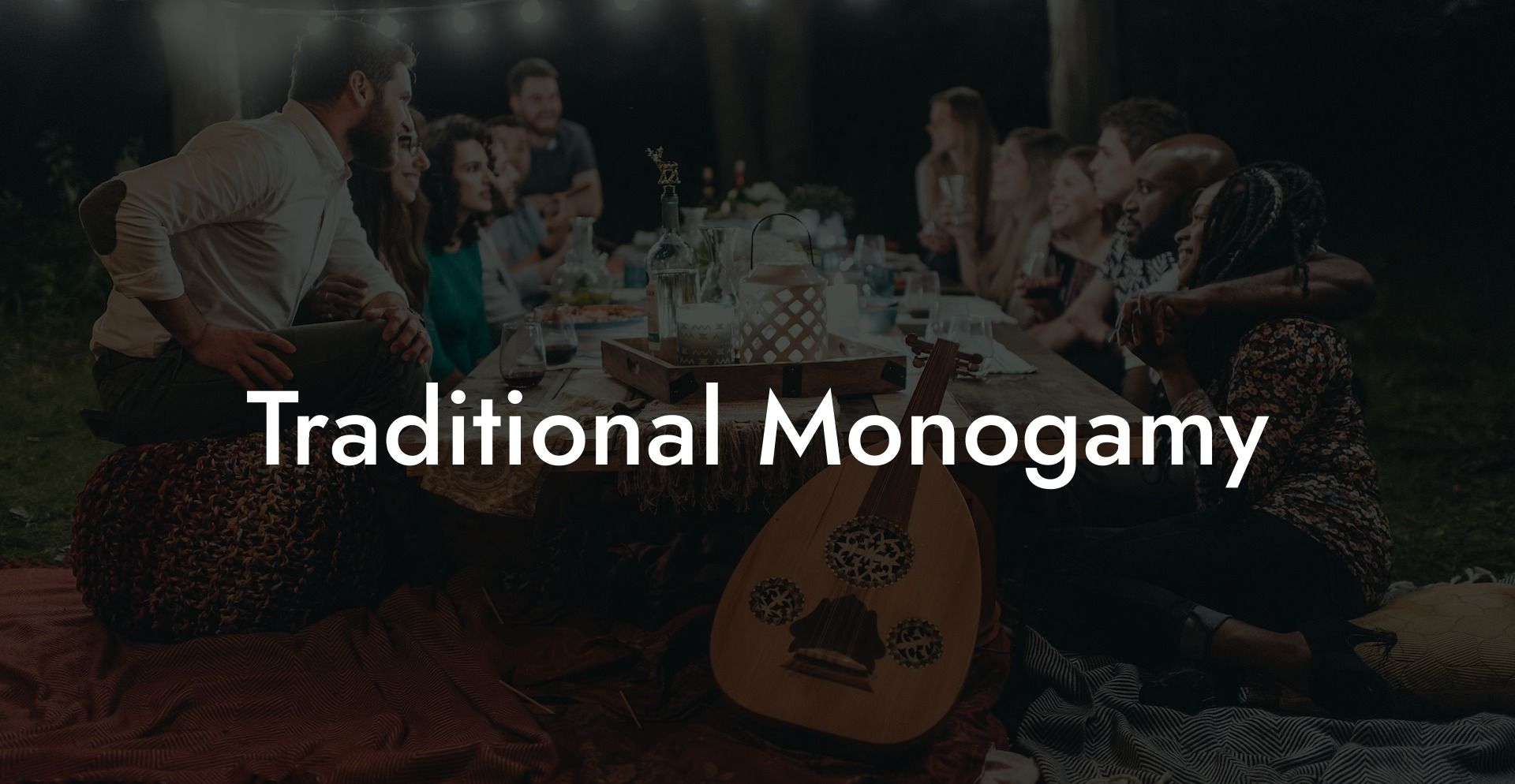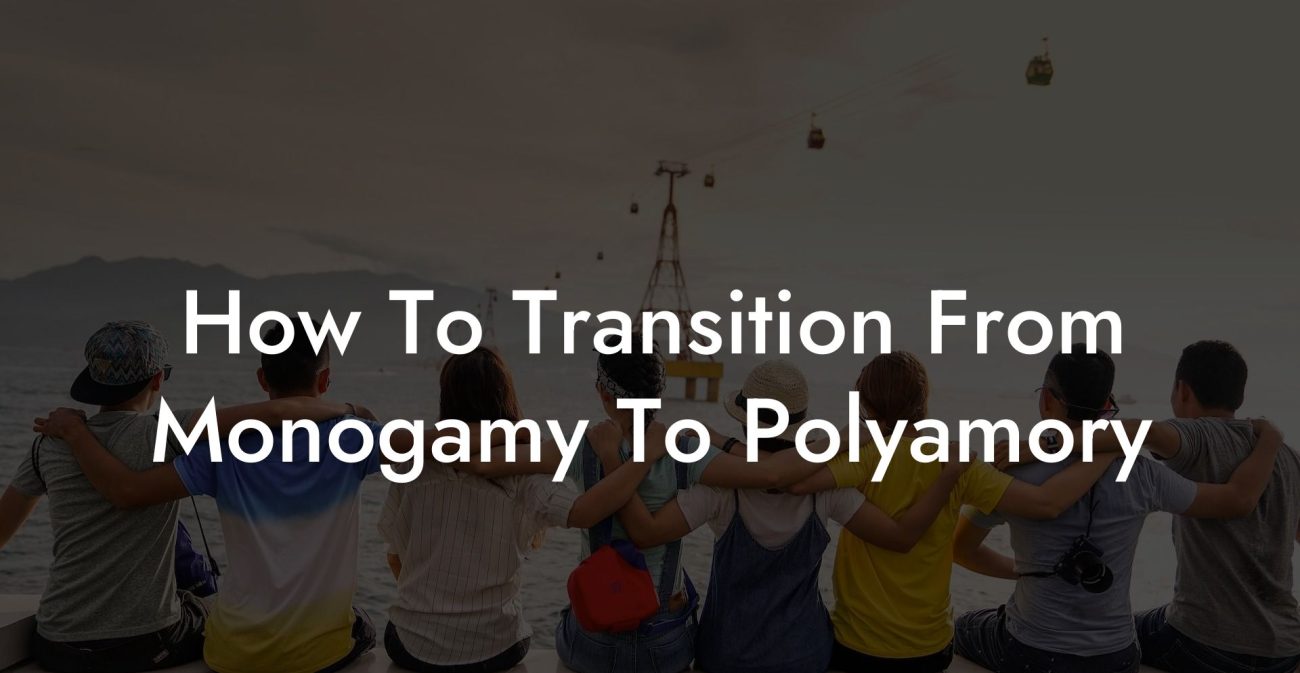Traditional Monogamy

Imagine a romance that’s as classic and comforting as your favorite vintage vinyl—where the idea of one true love isn’t a myth but a beautiful, intentional commitment. Welcome to Traditional Monogamy: a realm where devotion, loyalty, and deep emotional connection come together in a single, enduring partnership. In this guide, we’re taking you on an unforgettable journey through the ins and outs of traditional monogamy. We’ll explore its historical roots, the core values that make it tick, the benefits and challenges of committing exclusively to one partner, and practical strategies for nurturing a relationship that stands the test of time. Get ready to dive deep into a love story that’s as timeless as it is transformative.
Have you ever wondered if monogamy is just a stupid little experiment? Open relationships, polyamory, relationship anarchy...find out which relationship dynamic suits you best with our one minute relationship test. See if you are just conforming to "societal norms". Reveal your truth >>
Quick Links to Useful Sections
- Understanding Traditional Monogamy
- Defining Traditional Monogamy
- Historical and Cultural Context
- The Origins of Monogamous Relationships
- Cultural Expectations and Social Norms
- The Core Principles of Traditional Monogamy
- Commitment and Loyalty
- Emotional Intimacy and Vulnerability
- Exclusivity and Shared Values
- Mutual Growth and Partnership
- Benefits of Traditional Monogamy
- Deep Emotional Connection
- Simplicity in Relationship Dynamics
- Stability and Predictability
- Social and Cultural Acceptance
- Opportunities for Personal Growth
- Challenges of Traditional Monogamy
- Risk of Emotional Dependency
- Unrealistic Expectations
- Difficulty in Navigating Change
- External Pressures and Societal Norms
- Strategies for Thriving in Traditional Monogamy
- Foster Open and Honest Communication
- Set Realistic Expectations and Maintain Independence
- Establish Clear, Adaptable boundaries
- Invest in Self-Care and Mutual Growth
- Leverage Digital Tools to Enhance Connection
- Build a Supportive Community
- Expert Insights on Traditional Monogamy
- FAQ: Your Traditional Monogamy Questions Answered
Understanding Traditional Monogamy
Defining Traditional Monogamy
Traditional monogamy refers to a relationship model in which two individuals commit exclusively to each other for the long term. It’s built on the idea that the deepest emotional, romantic, and often sexual fulfillment is found by investing in one primary partner. This model values loyalty, exclusivity, and a shared vision for the future, and it is deeply woven into the cultural and historical fabric of many societies.
In traditional monogamy, both partners agree to focus all of their romantic and emotional energies on each other. This focused commitment often involves shared goals, such as building a family, establishing financial stability, and creating a life together that is centered on mutual growth and support.
Historical and Cultural Context
The Origins of Monogamous Relationships
While the idea of pairing up with one person might seem natural to many today, the history of human relationships is incredibly diverse. Monogamy emerged as a dominant model in many cultures for various reasons—economic stability, inheritance rights, social order, and even religious mandates played key roles in its establishment. Over centuries, the monogamous model became the norm, celebrated in art, literature, and cultural narratives as the ultimate expression of love and commitment.
However, it’s important to note that many ancient cultures also practiced forms of non-monogamy, and the rise of monogamy was as much a cultural evolution as it was a social necessity. Today, traditional monogamy is both revered for its stability and critiqued for its limitations. In modern times, it’s often seen as the gold standard of commitment—a way to build deep, enduring relationships by focusing on one partner.
Cultural Expectations and Social Norms
Traditional monogamy has been championed as the ideal relationship model in much of mainstream society. Movies, books, and even legal systems are largely designed around the concept of two people coming together exclusively. These cultural narratives create expectations around trust, fidelity, and a lifelong commitment that many find reassuring and deeply meaningful.
Yet, with the rise of alternative relationship models, traditional monogamy is increasingly being examined and redefined. While many still find unparalleled comfort in exclusivity, others question whether the model fully addresses the complexities of modern emotional life. Regardless, traditional monogamy remains a powerful, enduring paradigm for those who choose it.
The Core Principles of Traditional Monogamy
Commitment and Loyalty
At the heart of traditional monogamy is a commitment that goes beyond mere romantic attraction—it’s a pledge to invest your life in one person. This commitment is characterized by loyalty and a promise to support one another through all of life’s ups and downs.
Loyalty in this context means being there for your partner, sharing responsibilities, and making sacrifices for the sake of your relationship. It’s the kind of commitment that builds a stable foundation for a future together, whether that future involves raising children, building a home, or simply growing old side by side.
Emotional Intimacy and Vulnerability
Traditional monogamy offers the unique advantage of cultivating deep emotional intimacy. With only one partner to confide in, you can share your deepest fears, dreams, and insecurities without fear of judgment or divided attention. This vulnerability fosters trust and creates a safe space where both partners can truly be themselves.
The result is a relationship where every shared moment—whether joyous or challenging—adds layers to your emotional bond, making the connection richer and more resilient over time.
Exclusivity and Shared Values
Exclusivity is a defining feature of traditional monogamy. Both partners agree that their love and intimacy are reserved for each other, creating a sense of security and predictability that many find comforting. Shared values and goals often reinforce this exclusivity, as couples work together toward common objectives like financial stability, personal growth, or building a family.
This alignment of values not only strengthens the emotional connection but also helps couples navigate life’s challenges with a unified vision.
Mutual Growth and Partnership
Traditional monogamy is not static—it’s a dynamic partnership where both individuals grow and evolve together. The focused nature of the relationship encourages self-reflection and personal development, as each partner supports the other’s journey. Over time, this mutual growth can lead to a deeper understanding of oneself and one’s partner, creating an enduring, transformative bond.
The process of growing together often involves navigating conflicts, celebrating successes, and continuously learning how to better support each other—a journey that can be both challenging and immensely rewarding.
Benefits of Traditional Monogamy
Deep Emotional Connection
One of the most significant benefits of traditional monogamy is the profound emotional connection that can develop when two people devote themselves exclusively to each other. With no competing relationships for emotional energy, couples often experience a level of intimacy and understanding that is hard to match.
This deep connection can serve as a stable foundation during life’s inevitable challenges, providing a constant source of comfort and support.
Simplicity in Relationship Dynamics
Traditional monogamy offers clarity and simplicity in its relational structure. Without the need to juggle multiple relationships, there is less room for misunderstandings, scheduling conflicts, or emotional complexities that can arise in non-monogamous settings. This simplicity often leads to easier decision-making and a more straightforward path to conflict resolution.
The focus on a single partner streamlines communication and allows for a more concentrated effort in nurturing the relationship.
Stability and Predictability
Exclusivity in traditional monogamy creates a predictable environment where both partners know what to expect from each other. This stability can be incredibly reassuring, particularly during times of external stress or personal uncertainty. The commitment to one another fosters a sense of security that can provide emotional grounding and resilience.
Social and Cultural Acceptance
In many societies, traditional monogamy is the norm. This widespread acceptance can reduce external pressures and conflicts, as couples are more likely to find understanding and support from family, friends, and community institutions. For those who value societal validation, this can be a significant advantage.
Opportunities for Personal Growth
Being in a deeply committed, exclusive relationship encourages personal growth. As you navigate the challenges and triumphs of a monogamous partnership, you learn more about your own strengths, weaknesses, and values. This self-awareness not only enhances your personal development but also contributes to a more resilient and adaptive relationship.
Challenges of Traditional Monogamy
Risk of Emotional Dependency
One potential downside of traditional monogamy is the risk of becoming overly dependent on one partner for all your emotional needs. While deep connection is a benefit, it can also create vulnerability if one partner becomes the sole source of support. It’s important to cultivate personal interests and maintain other supportive relationships outside of the romantic bond.
Encouraging individual growth and external friendships helps ensure that both partners remain well-rounded and self-reliant, reducing the risk of emotional burnout.
Unrealistic Expectations
Society often romanticizes exclusive love, creating an idealized image of a perfect relationship. These unrealistic expectations can lead to disappointment and conflict when the inevitable challenges of life arise. No relationship is without its struggles, and expecting flawless harmony can put undue pressure on both partners.
It’s crucial to set realistic expectations and understand that every relationship requires work, compromise, and continuous communication.
Difficulty in Navigating Change
Relationships evolve over time, and even the most stable monogamous relationships face periods of change. Shifts in career, personal interests, or emotional needs can create tension if not managed effectively. Navigating these changes requires open dialogue, adaptability, and sometimes professional guidance.
Regularly reassessing your relationship goals and boundaries can help you adapt to these changes and maintain a healthy, enduring bond.
External Pressures and Societal Norms
While societal acceptance of traditional monogamy is generally high, external pressures can still influence your relationship. Cultural expectations and family pressures may sometimes lead to conflicts or misunderstandings about what it means to be truly happy in a monogamous partnership.
It’s important to define your own terms for success and fulfillment, rather than relying solely on external validation.
Strategies for Thriving in Traditional Monogamy
Foster Open and Honest Communication
The cornerstone of any successful exclusive relationship is open communication. Set aside regular time for deep conversations—whether it’s a weekly date night, daily check-ins, or monthly “relationship reviews.” Use “I” statements to express your feelings clearly and practice active listening to understand your partner’s perspective. By keeping the lines of communication open, you can address issues before they escalate and build a foundation of trust and intimacy.
Set Realistic Expectations and Maintain Independence
While it’s natural to seek a deep connection with your partner, it’s important to remember that no single person can fulfill every need. Encourage both partners to pursue personal interests, maintain friendships, and invest in individual growth. This balance not only prevents emotional dependency but also enriches your relationship by bringing diverse experiences into the partnership.
Establish Clear, Adaptable boundaries
Clearly define what is acceptable in your relationship—from how you handle finances to the expectations around emotional availability and sexual intimacy. Write down these boundaries if needed, and revisit them regularly to ensure they remain relevant as your relationship evolves. Being adaptable in your boundaries helps both partners feel secure and respected.
Invest in Self-Care and Mutual Growth
Self-care is the foundation of a healthy, balanced life. Make time for activities that nourish your body, mind, and soul—whether it’s exercise, meditation, reading, or pursuing a hobby. When you take care of yourself, you’re better equipped to contribute positively to your relationship. Consider participating in self-improvement workshops or couples therapy sessions that focus on personal growth and relationship dynamics.
Leverage Digital Tools to Enhance Connection
In today’s fast-paced world, digital tools can play a crucial role in maintaining connection. Use shared calendars to coordinate quality time, messaging apps for daily check-ins, and digital journals to track your progress together. These tools help manage the practical aspects of your relationship, ensuring that you both stay aligned even during busy periods.
Build a Supportive Community
Surround yourself with people who support and understand your relationship choices. Join local or online communities where traditional monogamy is celebrated and discussed openly. These networks provide emotional support, practical advice, and a sense of belonging, reinforcing your commitment to your relationship.
Expert Insights on Traditional Monogamy
Relationship experts often highlight that traditional monogamy, when entered into with clear intentions and maintained through open dialogue, can lead to profound emotional fulfillment and personal growth. Dr. Elena Rivera, a relationship therapist, explains, “Exclusive, monogamous relationships allow partners to develop deep emotional intimacy and trust. While they come with their own set of challenges, such as the risk of emotional dependency, they also offer unparalleled opportunities for shared growth and stability.”
Relationship coach Marcus Lee adds, “The beauty of traditional monogamy lies in its simplicity. Focusing your emotional energy on one person can create a powerful, transformative bond. It’s about embracing the journey together—acknowledging the challenges, celebrating the triumphs, and continually evolving as a couple.”
FAQ: Your Traditional Monogamy Questions Answered
1. What is traditional monogamy?
Traditional monogamy is a relationship model where two individuals commit exclusively to one another, investing all their romantic and emotional energy in a single, long-term partnership.
2. How does traditional monogamy differ from polyamory?
In traditional monogamy, the focus is on a single, exclusive connection between two people, whereas polyamory involves multiple consensual relationships simultaneously.
3. What are the benefits of traditional monogamy?
Benefits include deep emotional intimacy, a stable support system, clear communication, and simplicity in relationship dynamics.
4. Can traditional monogamy lead to personal growth?
Absolutely. The focused nature of an exclusive relationship encourages self-reflection, enhanced communication skills, and shared growth, leading to a more fulfilling personal and relational life.
5. What are some common challenges in traditional monogamy?
Challenges can include the risk of emotional dependency, unrealistic expectations, and difficulties in adapting to personal changes over time.
6. How important is communication in a monogamous relationship?
Communication is critical; regular, honest dialogue is essential for resolving conflicts, managing expectations, and deepening the emotional connection between partners.
7. How do we set boundaries in traditional monogamy?
Boundaries are established through self-reflection and open discussion about what is acceptable in your relationship. They should cover emotional, physical, and practical aspects and be revisited regularly as both partners evolve.
8. What if I feel overly dependent on my partner?
It’s important to maintain a balanced life by cultivating personal interests, friendships, and activities outside the relationship. This helps prevent dependency and fosters personal growth.
9. How can external pressures affect a monogamous relationship?
Societal expectations and cultural norms can sometimes create stress or unrealistic ideals. Focusing on your personal values and building a supportive community can help mitigate these external pressures.
10. Where can I find more resources on traditional monogamy?
Books, podcasts like “Where Should We Begin?” by Esther Perel, and online communities dedicated to monogamy offer valuable insights and guidance for building strong, exclusive relationships.
Resources and Community Support: Your Next Steps in Embracing Traditional Monogamy
- Books: Explore insightful works such as "Where Should We Begin?" by Esther Perel and other literature on relationship dynamics to deepen your understanding of exclusive love.
- Podcasts: Listen to relationship podcasts that focus on monogamy and intimate partnership, offering real-life stories and expert advice.
- Online Communities: Join forums and social media groups dedicated to traditional relationships to share experiences and gain support.
- Workshops and Webinars: Attend events focused on communication, conflict resolution, and self-growth in monogamous relationships for practical strategies.
- Therapy and Counseling: Seek professional guidance from relationship therapists who specialize in fostering healthy, exclusive partnerships.
Traditional monogamy remains a powerful, transformative way to experience love—a deep, focused connection that can enrich every facet of your life. With honest communication, well-defined boundaries, and the support of a nurturing community, you can build a resilient, fulfilling relationship that honors the beauty of exclusive love.
Lost & confused by all of the terms, types and seemingly made up 3 letter acronyms?? We've got you. Check out our Ethnical Non-Monogamy Dictionary >>
Useful Interruption: Not sure which relationship vibe fits you best? Take our Relationship Test, it’ll give you the real insight into your natural relationship style. Then, dive into our binge-worthy guides (from the tried-and-true to the “wait, that’s a thing?”) and find the perfect relationship type for your life:
- Monogamy
- Open Relationships
- Ethical Non-Monogamy
- Solo Polyamory
- Non-Hierarchical Polyamory
- Hierarchical Polyamory
- Relationship Anarchy
- Swinging
Now back to the main article but yeah take the test...












